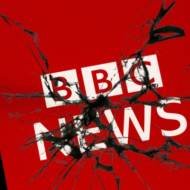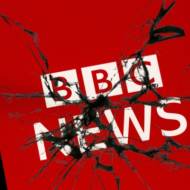
BBC’s Lame Excuses For Not Calling Hamas Terrorists

By describing Hamas terrorists as “militants,” the BBC presents Hamas as a legitimate state actor like Israel or the United Kingdom. In reality, nothing is further from the truth.
By Eliana Glogauer, Honest Reporting
The BBC’s choice of terminology vis a vis Hamas has created a public outcry in the UK. BBC World Affairs editor John Simpson responded by attempting to justify the public broadcaster’s refusal to describe what he called the “Hamas gunmen who carried out appalling atrocities in southern Israel” as terrorists.
Simpson explains that the BBC has a “duty to stay objective.” For that reason, he states, “We don’t take sides. We don’t use loaded words.” Simpson also mentions that “Some of the world’s most respected news organizations have exactly the same policy.” He goes on to claim that “…the BBC… [is] rightly held to an especially high standard,” and moreover, argues that “part of keeping to that high standard is to be as objective as it’s possible to be.”
It’s all well and good to argue that journalists shouldn’t use the word “terrorist” because it’s a “loaded word.” Many reputable news outlets have policies cautioning their journalists against the use of “loaded words.” Other reputable news organizations – notably Reuters, one of three “outfit[s]… [of] global reach” essential to the production of international news – use the term “loaded word” interchangeably with the term “emotive word.” [1]
Here’s the problem: the BBC is still using what Reuters and other news outlets call “loaded” or “emotive” words in the BBC’s coverage of Hamas atrocities.
In its “Israel and the Palestinians” section, the BBC news style guide actually tells journalists that, rather than using the word “terrorist,” they should use the word “militant” to describe terrorists like Hamas. Reuters, on the other hand, explicitly warns journalists against using “words like… ‘militant’” because words that “have emotional resonance, or their definitions are highly debatable, or are vague… should be used with special care in the interests of neutrality and accuracy.”
“Terrorist” is an emotive word used to describe actors whose actions and objectives we don’t like and don’t want to legitimize. In other words, we use the word “terrorist” to indicate that they are the bad guys. This ‘bad guys vs. good guys’ trope casts actors that work to keep us safe from terrorists (the State, through its military and its police force) into the role of the legitimate protagonist. This trope implicitly delegitimizes the terrorists in their role as the antagonist – the enemy of the State. So, using the word “terrorist” delegitimizes the terrorists, and legitimizes the State.
A word like “militant,” on the other hand, unfairly rebalances news coverage of terrorism the other way. Using the term “militants” to describe Hamas terrorists inadvertently elevates Hamas – a sub-state actor – to the level of a State, giving it legitimacy. And further, implying that its operatives are in pursuit of some kind of legitimate cause.
The Oxford English Dictionary (the BBC’s preferred reference) defines “militant” as “engaged in warfare, warring. Also: disposed towards war, warlike.” That definition of “militant” needs to be understood in the context of the Oxford English Dictionary definition of “war” as “Hostile contention by means of armed forces, carried on between nations, States, or rulers…” When the BBC calls Hamas “militants” they are giving Hamas a greater status and recognition than that odious group deserves.
Israel is an internationally recognized State; Hamas is a sub-State actor. Why does the BBC think it’s okay to avoid using a word like terrorism that rightly delegitimizes Hamas and deplores its atrocities? And further, why does the BBC think it’s appropriate to use a different loaded or emotive word – “militant” – which promotes Hamas to the status of a sovereign State and casts its atrocities as merely a by-product of legitimate inter-state warfare?
So, John Simpson, why the double standard? If you’re not going to call Hamas “terrorists,” at least don’t describe their operatives using a supposedly forbidden “loaded word” – a word that implicitly gives Hamas the same legitimacy as a recognized State.
Congratulations, BBC, you’ve lost objectivity. You say you’re in the business of “present[ing your] audience with the facts” so that they can “make up their own minds”? By describing Hamas terrorists as “militants,” you use the BBC’s voice to cast Hamas as a legitimate state actor like Israel or the United Kingdom. In reality, nothing is further from the truth.
The post BBC’s Lame Excuses For Not Calling Hamas Terrorists first appeared on United with Israel.
United with Israel